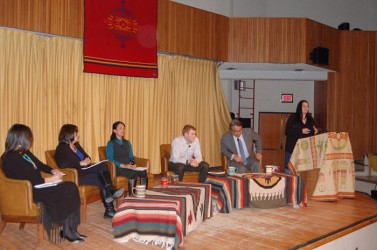Article Origin
Volume
Issue
Year
There is no ringing endorsement from Collette Arcand for a report on natural resource development released early March by an independent working group consisting of representatives from the Assembly of First Nations and Aboriginal Affairs and Northern Development Canada.
Advancing Positive, Impactful Change is the culmination of work begun in December 2013 and outlines ways in which First Nations can participate in and benefit from resource development on their land.
The report is missing a vital piece, said Arcand, who is senior regulator coordinator with Alexander Industry Relations Corporation of the Alexander First Nation in Alberta.
“I honestly expected more because I feel that this report fell short on recommendations when it comes to the duty to consult, because it did skip right over (it) to benefit, which is all part of accommodation. So what about consultation and what about compensation under accommodation?” asked Arcand.
She offered her comments as part of a five-member panel at the University of Alberta which discussed the relationship of the oil economy with Indigenous peoples.
The closest Advancing Positive, Impactful Change comes to consultation is in the recommendation of “engaging early, engaging often.”
Former United Nations Special Rapporteur Dr. James Anaya, who joined Arcand on the panel, also emphasized the importance of consultation, stating that Indigenous peoples needed to be involved from the beginning of the process. He also stressed the importance of Indigenous control of territory.
“There needs to be new models of development put in place,” said Anaya. In August 2013, Anaya tabled a report with the UN Human Rights Council addressing issues relating to extractive industries and the implications they have for the rights of Indigenous peoples.
“I believe a meaningful choice can only come about if Indigenous people have options.”
A full range of options must be taken into consideration, he said, which would mean a choice in inviting industry to develop on First Nations lands, partnering with industry in development, or First Nations operating their own development companies. And for Indigenous people to be fully engaged, they need to have support for capacity building, education, preferences for licensing, and access to capital, he added.
But Indigenous peoples also need to be able to say no to extractive resource development, Anaya said, and be able to consider other types of development – or no development at all.
“The best chance companies have to succeed… is to respect Indigenous peoples’ rights. If government and companies are going to try to force themselves on these territories and not fully respect Indigenous peoples’ rights, there’s only going to be continuous conflict,” he said.
Panelist Isabel Altamirano-JimÈnez compared the situation of Indigenous people in Canada with those in Mexico. The U of A political scientist said Indigenous peoples’ traditional livelihood is being demeaned by governments and corporations, who continue to push for development.
Arcand believes that Advancing Positive, Impactful Change continues along that vein.
“What I believe this (report) does is supplement the political agenda that continues to promote the misconception that the only way to a better life for First Nations is through the acceptance of this northern Albertan economy,” she said.
The report is co-chaired by AFN Alberta Regional Chief Cameron Alexis and New Brunswick and Prince Edward Island Regional Chief Roger Augustine. “
“We strongly urge that the next roundtable focus exclusively on resource revenue sharing, an urgent and pressing issue for this country and all First Nations,” the report states in the executive summary.
But resource revenue sharing is not a path provinces have embraced, said Arcand.
Two recent meetings held between Alberta Premier Jim Prentice, who also serves as Aboriginal Relations minister, and department Associate Minister David Dorward with chiefs from Treaty 6 and Treaty 8 underscore this point.
“Alberta has no policy on resource revenue sharing, those words, but we certainly have a desire to have all Albertans, including First Nations people, be involved in the downstream result of the development of Alberta’s resources,” said Dorward.
Advancing Positive, Impactful Change outlines a number of recommendations, including the development of a central knowledge and information resource. It would make technical information and advisory services available to First Nations to assist them in natural resource development, and developing models for collaboration among First Nations to pursue joint venture opportunities.
Photo Caption: University of Alberta communications and recruitment coordinator Jodi Stonehouse moderates a panel discussion on Exploring the Relationship of the Oil Economy with Indigenous Peoples and their Rights and Responsibilities (from left): Danika Littlechild, Collette Arcand, Isabel Altamirano-JimÈnez, Andrew Leach and James Anaya.
- 1811 views

